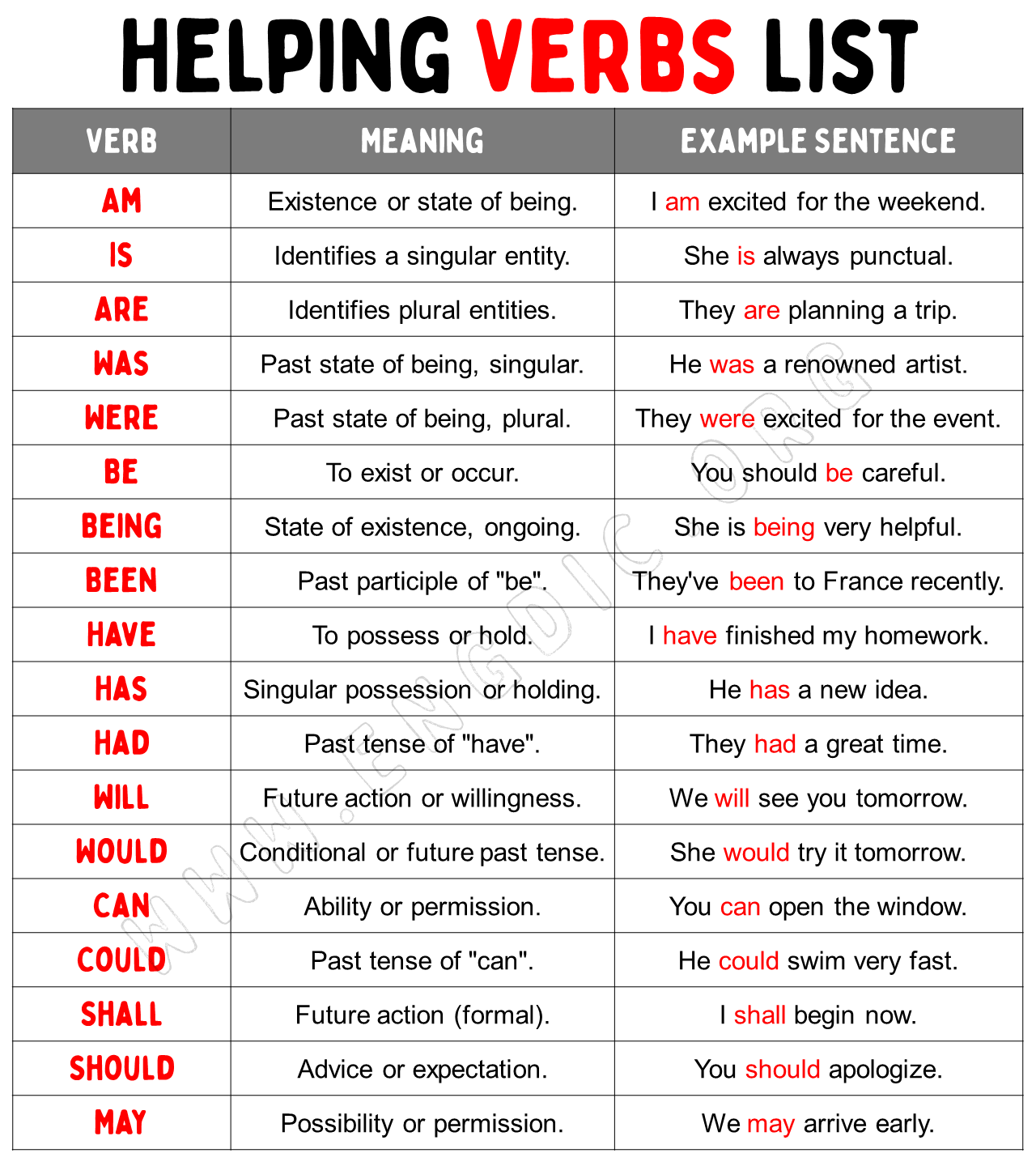If you’re studying English as a second language, then you know that verbs are an important part of speech. There are many different types of verbs, but one type that you might not be familiar with is the helping verb. In this lesson, we’ll provide a helping verbs list and examples to help you better understand how they’re used. Keep reading to learn more!
Definition of Helping Verbs
A helping verb is a verb that helps to form the tense of another verb. In other words, it doesn’t indicate an action or occurrence but instead helps to show when the action took place or will take place. There are three main types of helping verbs:
- Auxiliary verbs – These verbs help to form compound tenses, such as the past perfect and future perfect. Some common auxiliary verbs are “will,” “have,” and “been.”
- Modal verbs – These verbs express levels of ability, doubt or certainty, and opinion. Some common modal verbs are “can,” “may,” and “must.”
- Persistent helping verbs – These verbs are always used with another verb, and they include “do,” “does,” “did,” and “be.”
Helping Verbs List
Below is a helping verbs list of some of the most common verbs in English. Note that this is not an exhaustive list, but it should give you a good idea of the different types of helping verbs that are out there.
Below is the list of helping verbs:
- am, is, are
- have, has, had
- was, were
- shall, will
- do, does, did
- may, must, might, can
- be, been, being
- should, would, could
Auxiliary Verbs:
will, have, been, am, is, are, was, were
Modal Verbs:
can, may, must, ought to, should
Persistent Helping Verbs:
do, does, did, be
Helping Verbs With Definitions and Examples
Here’s a list of common helping verbs, each with a brief definition and an example sentence:
- Am: Existence or state of being.
- I am going to school tomorrow.
- Is: Identifies a singular entity.
- She is always punctual.
- Are: Identifies plural entities.
- They are planning a trip.
- Was: Past state of being, singular.
- He was a renowned artist.
- Were: Past state of being, plural.
- They were excited for the event.
- Be: To exist or occur.
- You should be careful.
- Being: State of existence, ongoing.
- She is being very helpful.
- Been: Past participle of “be”.
- They’ve been to France recently.
- Have: To possess or hold.
- I have finished my homework.
- Has: Singular possession or holding.
- He has a new idea.
- Had: Past tense of “have”.
- They had a great time.
- Will: Future action or willingness.
- We will see you tomorrow.
- Would: Conditional or future past tense.
- She would try it tomorrow.
- Can: Ability or permission.
- You can open the window.
- Could: Past tense of “can”.
- He could swim very fast.
- Shall: Future action (formal).
- I shall begin now.
- Should: Advice or expectation.
- You should apologize.
- May: Possibility or permission.
- We may arrive early.
- Might: Less certain “may”.
- It might rain later.
- Must: Necessity or obligation.
- You must wear a helmet.
- Do: To perform an action.
- They do play well together.
- Does: Singular form of “do”.
- He does know the answer.
- Did: Past tense of “do”.
- They did enjoy the movie.


Helping Verb Examples Sentences
Now that you know about helping verbs, let’s take a look at some examples of how they’re used.
- I will have been working on this project for six months by the time it’s due.
- He has been doing well in his English class.
- She can’t have finished her work yet – it’s only been an hour!
- You should have called me earlier.
- I do my best to avoid conflict.
- He does seem like a friendly person.
- I am writing a letter.
- He has been working on the project for two weeks.
- They were playing games all night.
- I will call you later.
- You should do your homework.
- Do you think he might come?
- The cat can jump high.
- She has been teaching English for ten years.
As you can see, helping verbs are used to form tenses and to modify the main verb. They’re an important part of speech, so it’s important to understand how they work!
Last updated on March 29th, 2024 at 10:51 am